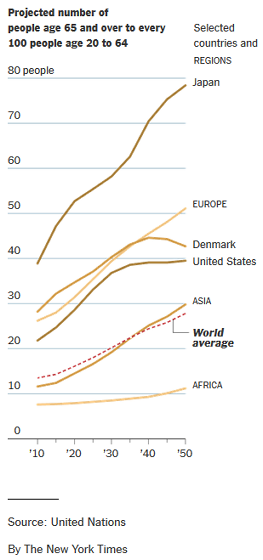Possibility that more positive sex education could increase birth rates

The declining birthrate and aging population is a problem not only in Japan but all over the world, but in Denmark, various measures are being taken nationwide to increase the birth rate, including efforts to make sex education more positive.
Sex Education in Europe Turns to Urging More Births - NYTimes.com
Sex education often focuses on negative topics about pregnancy, such as contraception. However, Marianne, director of the Danish nonprofit organization 'Sex and Society,' said, 'We've been talking about contraception for a really long time, but we've started to think that what we should actually do is teach people how to get pregnant.' In order to stop the declining birthrate, she is increasing opportunities for children to receive sex education and is starting a sex education program that is positive about pregnancy.
The photo below shows 25 13- to 14-year-olds gathered at a school in Copenhagen, Denmark, to talk about sex. The children are awkward, some fiddling with their red fingernails and others fiddling with their cell phones. When the topic turns to masturbation, a boy bursts out laughing, and the girl across from him begins giggling and covering her mouth with her hand. The 29-year-old male instructor responds, 'It's okay to laugh,' and 'We're talking about touchy topics.'

In the early 1970s, Denmark had a birthrate of two children per woman, but today the birthrate is not high enough to sustain the population. Furthermore, aging is not just a problem in Denmark; it is a global issue. Japan is already facing a birthrate problem, with adult diapers outselling baby diapers. In February 2015, Italy's Minister of Health described Italy as a 'dying country.' Germany has also spent a lot of money on subsidies for families to combat the declining birthrate, but these efforts are said to have had little effect.
The graph below shows the change over the next 40 years in the number of people aged 65 and over per 100 working-age people between 20 and 64. There are line graphs for Japan, Europe, Denmark, the United States, Asia, the global average, and Africa. As of 2010, there were nearly 40 people aged 65 in Japan, compared with 28 in Europe. However, in 40 years, both Japan and Europe are projected to have nearly doubled their numbers. Meanwhile, Denmark is the only country where the population of people aged 65 and over is expected to decline from 2040 onward.

There is no consensus on the impact of demographics. Some see it as the natural maturation of a highly developed society, others as a disaster. But the fact is that a twin burden of fewer workers and more retirees is straining the workforce that keeps society running. High unemployment discourages young people from becoming parents, and declining birth rates create a labor shortage, creating a vicious cycle.
But despite the social unrest, many Danes are finding creative outlets. One priest made headlines with an impassioned treatise on sex and eroticism, while another entrepreneur created a pro-natal dating website. One travel agency ran a campaign targeting young couples at a Paris hotel, stating that 'Danish people have more sex on holiday' and asking, 'Can sex save Denmark's future?' The response to the campaign was positive, with the Danish media covering it as a 'normal' topic, rather than something to hide, according to travel agency owner Eva.
As a result of these efforts, Denmark's birth rate has risen for the first time in four years. Marianne laughed and said, 'I don't know if it's our fault,' but the Danish Minister of Education said, 'We will continue to take a proactive approach to health and sexuality.'
Related Posts:







